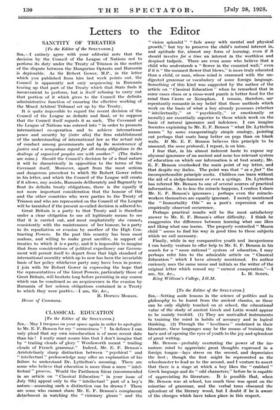CLASSICAL EDUCATION
[To the Editor of the SPECTATOR.] SIR,—May I trespass on your space again in order to apologize to Mr. E. F. Benson for my " earnestness " ? In defence I can only plead that my own miseducation is of more recent date than his ! I really must assure him that I don't imagine that by " trailing clouds of glory " Wordsworth meant " trailing clouds of French grammar." Indeed, Mr. E. F. Benson's Aristotelianly sharp distinction between " psychical " and " intellectual " preknowledge may offer an explanation of his failure to understand Dr- Lyttelton's meaning. There are some who believe that education is more than a mere " intel- lectual " process. Would the Parthenon frieze (recommended in an article on " Classical Education " in your issue of July 7th) appeal only to the " intellectual " part of a boy's nature—assuming such a distinction can be drawn ? There are some who cannot share Mr. E. F. Benson's complacent detachment in watching the " visionary gleam " and the " vision splendid " " fade away with mental and physical growth," but try to preserve the child's natural interest in, and aptitude for, almost any form of learning, even if it should involve for a time an interest in the worthless and despised tadpole. There are even some who believe that a child who understands a " flower in the crannied wall," even if it is " the meanest flower that blows," is more truly educated than a child, or man, whose mind is crammed with the un- digested grammar or vocabulary of some foreign language. Something of this kind was suggested by the author of the article on " Classical Education " when he remarked that in some eases chess or a cross-word puzzle is better food for the mind than Cicero or Xenophon. I remain, therefore, un- repentantly romantic in my belief that those methods which work on the basis of what a boy already possesses (whether " intellectually," or " psychically," or emotionally or morally) are essentially superior to those which work on the basis of natural ignorance and indolence. I can imagine Socrates explaining to Mr. E. F. Benson " what Dr. Lyttelton means " by some exasperatingly simple analogy, pointing out perhaps that coats hang better on pegs than on blank walls. If Mr. E. F. Benson believes this principle to be unsound, the onus probandi, I repeat, is on him.
I fear that, in his almost indecent haste to expose my abysmal ignorance of an ancient and none too relevant system of education on which our information is at best scanty, Mr. E. F. Benson overlooked the main point of my letter, and that despite my italics. The point was- that " as a fact" the incomprehensible principle works. Children can learn without the aid of a sledge-hammer or even a syringe. Dr. Lyttelton has referred Mr. Benson to one of several sources of practical information. As to how the miracle happens, I confess I share Mr. E. F. Benson's ignorance ; perhaps even the rniraele- workers themselves are equally ignorant. I merely mentioned the " Immortality Ode " as a poet's expression of an empirically observed occurrence.
Perhaps practical results will be the most satisfactory answer to Mr. E. F. Benson's other difficulty. I think he exaggerates the difference between learning what one likes and liking what one learns. The properly controlled " Mason child " seems to find his-way in good time to those subjects which we call necessary.
Finally, while in my comparative youth and inexperience I can hardly venture to offer help to Mr. E. F. Benson in his search for a " more rational " system of education, I may perhaps refer him to the admirable article on " Classical Education " which I have already mentioned. Its author curiously uses the same name and initials as the writer of the original letter which roused my " earnest exasperation."—I_




































 Previous page
Previous page